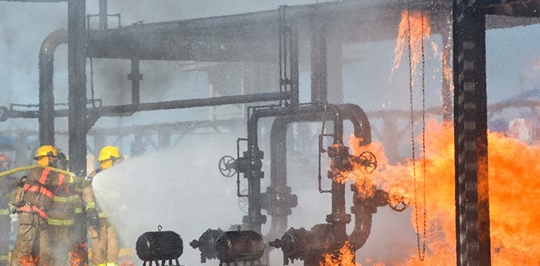Oilfields and offshore drilling rigs have had their share of catastrophes that have resulted in significant injury or death. However, a serious concern in today’s oil industry is the comprehensive pipeline network that runs throughout the country.
According to the Pipeline and Hazardous Materials Safety Administration (PHMSA), the U.S. has a 2.6 million-mile pipeline transportation system that produces 1 million daily shipments of hazardous materials. While oil pipelines are generally stable, pipeline failure at any point in the network could be devastating, possibly resulting in explosions, property damage, and loss of life.
Here we’ll discuss some frequently seen causes of pipeline explosions. Hopefully, by understanding why pipeline explosions happen, workers and others can better prepare and avoid accidents.
How Common Are Pipeline Incidents?
According to the PHMSA, pipeline incidents have resulted in 10 fatalities, 24 reported injuries, and $800 million in property damage in 2022. Over 20 years (2003-2022), 274 pipeline fatalities and 1,120 injuries have occurred. As of this writing, three people have died, and six were injured because of pipeline incidents in 2023.
The Main Causes of Pipeline Explosions
PHMSA data reveals that five leading causes of pipeline damage could cause an explosion in 2022: Corrosion, excavation damage, incorrect operation, equipment failure, and natural force damage.
Corrosion
Corrosion is one of the leading causes of pipeline failure in the United States and accounted for 21,052 barrels spilled in 2022. Corrosion could either cause a leak or a rupture. Leaks are less of a concern with gas pipelines; however, a leak in a liquid oil pipeline could result in a fire or explosion. Further, corrosion could be either internal or external.
External corrosion is more common, accounting for 90% of corrosion-related pipeline failures. This is mainly because pipeline coating wasn’t required before 1970. Without proper coating, pipelines are more likely to corrode over time. Since many oil pipelines were established before 1970, older pipes could have miles of corrosion damage.
Excavation Damage
Excavation damage involves any direct puncture, dent, scrape, or other damage inflicted on the pipeline during digging. To avoid damage to an underground pipeline, excavators must make “One-Call” notifications before digging to ensure the area is free from buried facilities. The site should be appropriately marked to avoid damage if properly constructed.
Excavation damage could cause several issues, and excavators might not know they damaged the pipeline immediately. A punctured pipeline could cause hazardous liquids to leak, increasing the risk of fires or explosions.
Additionally, excavators could damage the pipeline’s protective coating, making the pipe more susceptible to corrosion.
Incorrect Operation
Workers hold a lot of responsibility when operating an oil pipeline. One mistake could put many people at risk of severe injuries or death. Poor training or lack of experience could increase the risk of on-the-job mistakes. PHMSA offers the following as examples of incorrect operation:
- Leaving a wrong valve open
- Overfilling a tank
- Over-pressuring a piece of equipment
- Mismarking an underground pipeline prior to excavation work
Although human error is not always the primary cause of a pipeline failure, workers have been known to worsen situations by making mistakes as they scramble to contain the issue.
Equipment Failure
Equipment failures involve any pipeline component that fails to perform its intended function. These incidents could result in hazardous liquids releasing into the environment or surrounding area. Equipment could fail in several different ways, including the following:
- Level gauges on tanks that store hazardous liquids could fail and cause the tank to overfill
- Pressure control devices could fail and cause the pipeline to rupture
- Pumps or compressors that move hazardous liquid through the pipeline could malfunction
Other pipeline components, such as meters or metering equipment, flanges, fittings, couplings, and more, could also malfunction.
Natural Forces
In addition to aging pipes, malfunctioning equipment, and human error, natural forces could also play a role in pipeline failure. Since the pipeline network is present throughout the United States, pipelines could be at the mercy of various natural disasters.
Naturally occurring events include tornados, hurricanes, earthquakes, floods, etc.
Injured in a Pipeline Explosion? Call Kemmy Law Firm
Whether the pipeline explosion resulted from corrosion, human error, or failed equipment, you should be compensated for all your damages. An oilfield injury lawyer could examine the cause of your accident and determine who’s at fault for your damages.
A negligent employer, employee, or third party could be liable, and the attorneys at Kemmy Law Firm will gather the evidence needed to prove fault. Contact our office today by calling 844-334–4388 to schedule your free consultation.
The post What Are the Main Causes of a Pipeline Explosion? appeared first on Kemmy Law Firm.






